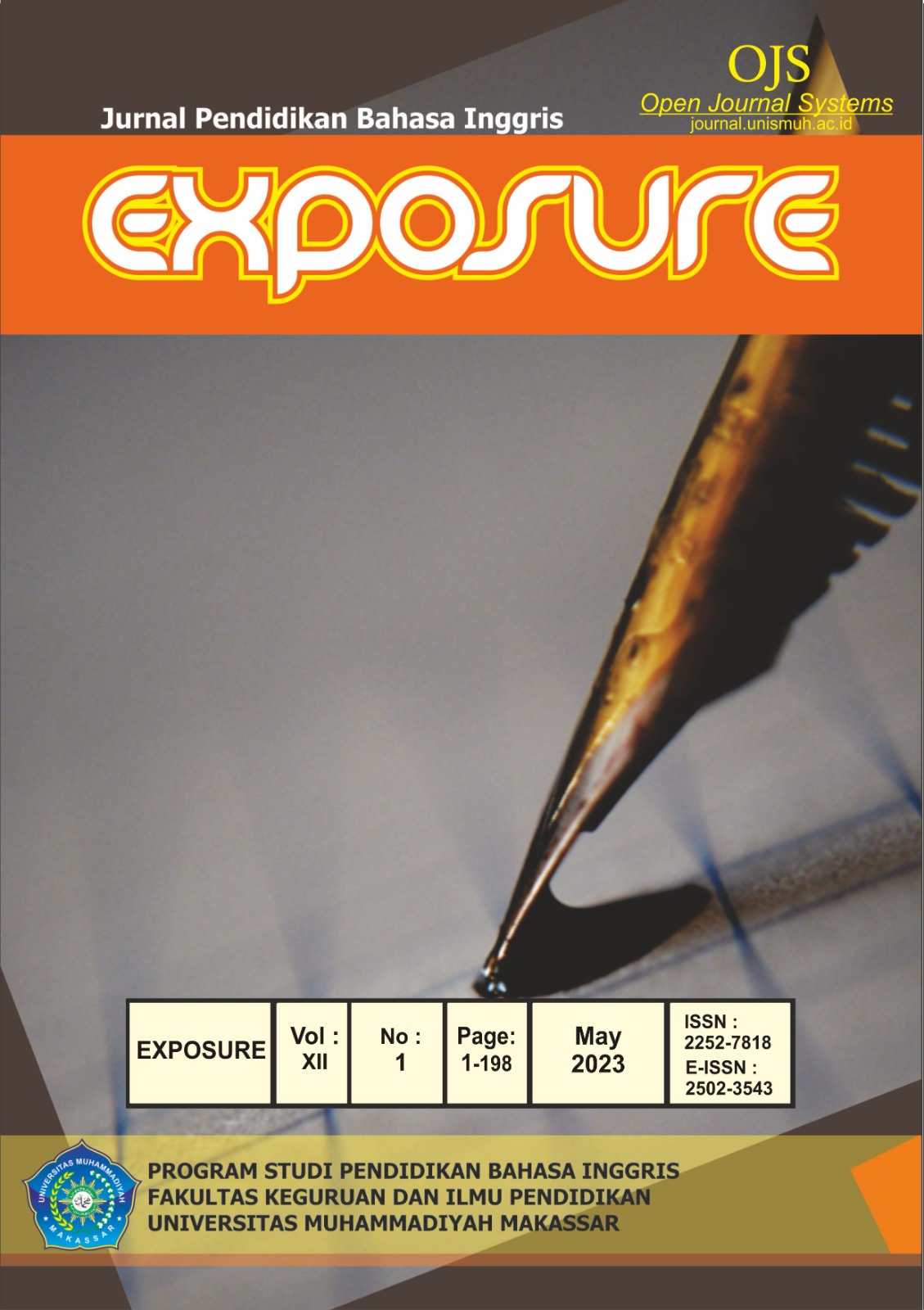IMPROVING READING ABILITY AND MOTIVATION WITH A SMART APP CREATOR
DOI: https://doi.org/10.26618/exposure.v12i1.10437
Smart App Creator, Reading Ability, Motivation
Abstract
The goal of this study was to discover and analyze the process of using smart app creator to improve the reading ability of eleventh grade engineering students at SMK Negeri 3 OKU Selatan. This study employed the classroom action research method, in which the researcher collaborates with another English teacher. This study was carried out in three cycles in accordance with the Kemmis and Taggart action research methodology. The study's findings revealed that students' reading abilities and motivation had improved. The minimal completion score for the English lesson was 70. Identifying 15 students, or 50% of the class, who meet the minimum completion criteria in cycle 1. Twenty students, or 66% of the class, passed the cycle 2 finding test's minimum completeness requirements, and 26 students, or 86% of the class, passed the cycle 3 finding test's minimum completeness criteria. Students' reading abilities improved from cycle 1 to cycle 2. Reading skills improved by 16% between cycles 1 and 2, and 20% between cycles 2 and 3. Students' participation in the teaching-learning process increased, indicating an increase in students' motivation.
References
Abidin, N., & Arifin, S. (2021). Arabic Language Learning Design Through Smart Apps Creator Applications. 581(Incesh), 283–287.
Brown, H. D. (2004). Language Testing Book: Principles and Classroom Practice. Book, 314.
Davies, Florence. (1995). Introducing Reading .England: PenguinBook
Dawson, Mildred A and Bamman,Henry A. (1967).Fundamentals of Basic Reading Instruction. New York: David McKay Company.
Diem, C. D. (2011). 3-LS: a model for teaching young learners. TEFLIN Journal, 22(2), 125-149.
Hidayati, T. (2016). English Language Teaching in Islamic Education in Indonesia; Challenges and Opportunities. Englisia Journal, 3(2), 65.
Khoirudin, R., Ashadi, a., & Masykuri, M. (2021). Smart Apps Creator 3 to improve student learning outcomes during the pandemic of COVID-19. JPBI (Jurnal Pendidikan Biologi Indonesia), 7(1), 25–34.https://doi.org/10.22219/jpbi.v7i1.13993
Mendari, A. S. K. (2010). 1 Aplikasi Teori Hierarki Kebutuhan Maslow Dalam Meningkatkan Motivasi Belajar Mahasiswa Anastasia Sri Mendari. Widya Warta: Jurnal Ilmiah Universitas Katolik Widya Mandala Madiun, 34(01), 82 91.epository.widyamandala.ac.id/536/1/B. Anastasia Sri Mendari
Simaibang, B. (2017). English Language Teaching in A Foreign Situation.
Suryaningtyas, V. W., Nugroho, R. A., Cahyono, S. P., Nababan, M. R., & Santosa, R. (2019). Translation Learning Enrichment Using Smart Application Creator 3.0: An Attempt to Design a Mobile Application in Translation for Tourism Purpose Course. Proceedings - 2019 International Seminar on Application for Technology of Information and Communication: Industry 4.0: Retrospect, Prospect, and Challenges, iSemantic 2019, 542–547. https://doi.org/10.1109/ISEMANTIC.2019.888 4273
Tambunan, H. (2018). The Dominant Factor of Teacher’s Role as A Motivator of Students’ Interest and Motivation in Mathematics Achievement. International Education Studies, 11(4), 144. https://doi.org/10.5539/ies.v11n4p144
Tyagi, B. (2013). Listening: an important skill and its various aspects. The Criterion: An International Journal in English, 12, 1–8. www.the-criterion.com
Downloads
Published
How to Cite
Issue
Section
License
Authors who publish with this journal agree to the following terms:
In order to assure the highest standards for published articles, a peer review policy is applied. In pursue of the compliance with academic standards, all parties involved in the publishing process (the authors, the editors and the editorial board and the reviewers) agree to meet the responsibilities stated below in accordance to the Journal publication ethics and malpractice statement.
Duties of Authors:
- The author(s) warrant that the submitted article is an original work, which has not been previously published, and that they have obtained an agreement from any co-author(s) prior to the manuscript’s submission;
- The author(s) should not submit articles describing essentially the same research to more than one journal;
- The authors(s) make certain that the manuscript meets the terms of the Manuscript Submission Guideline regarding appropriate academic citation and that no copyright infringement occurs;
- The authors(s) should inform the editors about any conflict of interests and report any errors they subsequently, discover in their manuscript.
Duties of Editors and the Editorial Board:
- The editors, together with the editorial board, are responsible for deciding upon the publication or rejection of the submitted manuscripts based only on their originality, significance, and relevance to the domains of the journal;
- The editors evaluate the manuscripts compliance with academic criteria, the domains of the journal and the guidelines;
- The editors must at all times respect the confidentiality of any information pertaining to the submitted manuscripts;
- The editors assign the review of each manuscript to two reviewers chosen according to their domains of expertise. The editors must take into account any conflict of interest reported by the authors and the reviewers.
- The editors must ensure that the comments and recommendations of the reviewers are sent to the author(s) in due time and that the manuscripts are returned to the editors, who take the final decision to publish them or not.
Authors are permitted and encouraged to post online a pre-publication manuscript (but not the Publisher’s final formatted PDF version of the Work) in institutional repositories or on their Websites prior to and during the submission process, as it can lead to productive exchanges, as well as earlier and greater citation of published work (see The Effect of Open Access). Any such posting made before acceptance and publication of the Work shall be updated upon publication to include a reference to the Publisher-assigned DOI (Digital Object Identifier) and a link to the online abstract for the final published Work in the Journal.














